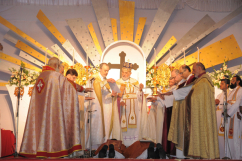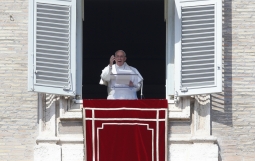The few Assyrian Christians who have been released by Islamic State after being taken hostage last week were forced to pay a religious tax, a British-based monitor has revealed.
According to the Syrian Observatory for Human Rights [SOHR], 19 hostages – 17 men and two women – were released on Sunday after being processed through a sharia court. Each family was told to pay a tax for non-Muslims in exchange for their release.
Assyrian TV then reported that four more Assyrians – a married couple, a woman and her 6-year-old daughter – were released on Tuesday. The circumstances under which they have been released are as yet unknown.
IS militants have been known to levy hefty fines on those who don't follow Islam. When the group overran the northern Iraqi city of Mosul last June, it was announced over loudspeakers that they had "come to liberate" the city, and Christians – who have lived in Mosul for 2,000 years – were told to either flee, convert to Islam, or pay a tax. Those who refused risked death "by the sword".
Chief Executive of Christian Solidarity Worldwide, Mervyn Thomas, has expressed concern at the latest use of the religious tax.
"While we are relieved to hear of the release of these hostages, it is worrying that they have been made to pay an unjust tax enforced by non-nationals in order to continue living in their ancestral homes," he said in a statement.
"Our thoughts and prayers continue to be with those who are still held captive by a sect that does not hesitate to plumb to the depths of inhumanity. We renew our call to the international community to provide protection for Syria's religious and ethnic minorities against an onslaught that seeks to erase the country's diverse heritage."
Islamic State undertook dawn raids in a number of villages inhabited by Assyrian Christians, an ancient Christian minority, near Tel Hmar, south of the Khabour river, on 23 February. Further attacks bought the number of villages targeted to 35, forcing around 3,000 to flee.
Estimates vary as to how many were abducted in the attacks. SOHR has calculated 220, while the Assyrian Network for Human Rights claimed that as many as 250 people were taken. Several churches were also destroyed.
At a press conference on Tuesday, spokesman for the European Syrian Union, David Vergili, said vulnerable minority groups are enduring endless suffering in the region.
"There is ongoing genocide, killings and abductions against native people of [the] Middle East," he said.
"We, as Chaldean-Syriac-Assyrian people, commemorate the centennial of Sayfo 1915 against us under the Ottoman-Turkish rule. Today, 100 years later, we face the same threat that can be the final step to end our existence in the homeland.
"As citizens of European countries, it is within our rights to ask for European and international support to our people in the Middle East. We do not have time to lose. There are new dynamics and actors in the region, and the international community also needs a new approach in order to stop this total collapse."
Jeff Gardner, spokesperson for Restore Ninevah Now Initiative, a group working for the protection and relief of Assyrian Christians, said: "We are absolutely appalled, but not surprised, by the actions of the Islamic State. They continue to do what they do – terrorize, murder, and pillage."

















